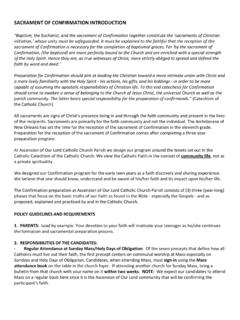Transcription of PHILOSOPHY - Roman Catholic Archdiocese of Los Angeles
1 CHRISTIAN INITIATION OF CHILDREN WHO HAVE REACHED CATECHETICAL AGE GUIDELINES AND RECOMMENDATIONS PHILOSOPHY The sacraments of Christian initiation Baptism, confirmation , and the Eucharist lay the foundationsof every Christian life. (The Catechism of the Catholic Church, #1212) The norms established for the Christian Initiation of Children Who Have Reached Catechetical Age are outlined in Part II, Chapter 1of the Rite of Christian Initiation of Adults (RCIA #252 330).The rite states: This form of the rite of Christian initiation is intended for children not baptized as infants, who have attained the use of reason and are of catechetical age.
2 They seek Christian initiation either at the direction of their parents or guardians or, with parentalpermission, on their own initiative. Such children are capable of receiving and nurturing a personal faith and of recognizing an obligation of conscience. (RCIA#252) The initiation of children of catechetical age is a process based on their personal conversion. It is adapted to their spiritual progress and growth of faith rather than oncognitive knowledge. Because the criteria for initiation are based on assessing conversion of heart and action (RCIA #42 and 75), there is no time line for initiating these children.
3 It could take several years, if necessary. The duration of the catechumenate will depend on the grace of God and on various (RCIA #76) The Christian initiation of these children requires both a conversion that is personal and somewhat developed, in proportion to their age, and the assistance of the education they need. The process of initiation thus must be adapted both to their spiritual progress, that is, to the children's growth in faith, and to the catechetical instruction they receive. Accordingly, as with adults, their initiation is to be extended over several years, if need be, before they receive the sacraments .
4 (RCIA, #253) GOALS 1. Children of catechetical age and adults will be brought to the sacraments of Baptism, confirmation , and Eucharist through the development, promotion, and implementation of the initiation process presented in the Rite of Christian Initiation of Adults. This liturgical rite of the church is the official norm to be followed in the initiationof adults and children who have reached catechetical age. a) The Rite of Christian Initiation of Adults includes not simply the celebration of the sacraments of baptism, confirmation , and eucharist, but also all the rites belonging to the catechumenate.
5 (RCIAI ntroduction, #1) When the sacraments of initiation are celebrated for children who have reached catechetical age, it is assumed that they will also celebrate all of the rites belonging to the catechumenate. The Code of Canon Law states, in Can. 852, that The provisions of the canons on adult baptism apply to all those who, being no longer infants, have reached the use of reason. Thus, children from approximately the age of seven years to around fourteen to eighteen years are to be considered of catechetical age. Children, like adults, travel a journey of faith based on their spiritual progress.
6 Various rites mark their growth in faith and culminate with the celebration of baptism, confirmation , and eucharist. In general, children follow the same path towards initiation as adults. There is one initiation process for both adults and children. b) b. As with adults, initiation of children is marked by several stages: Pre catechumenate, Catechumenate, Purification and Enlightenment, and Mystagogy. These stages in the initiation of children are marked by liturgical rites: Acceptance into the Order of Catechumens (RCIA #260 276), the optional Rite of Election (RCIA #277 290), penitential rites or scrutinizes (RCIA# 291 303), and the celebration of the sacraments of initiation (RCIA# 304 329).
7 Corresponding to the periods of adult initiation are the periods of the children s catechetical formation that lead up to and follow the steps of their initiation. (RCIA#253) c) c. While children follow the same journeyof faith as adults, there are distinctions and differences based on their age and developmental stages. In many ways, then, the rite cautions that ..they cannot yet be treated as adults because, at this stage of their lives, they are dependent on their parents or guardians and are still strongly influenced by their companions and their social surroundings. (RCIA #252).
8 2. Parents, guardians, and families of children preparing for initiation will be fully involved in the process. Their care, support, and example are necessary for the faith life of the children to grow and flourish. a) It is vital that parents, guardians, or other family members be included in the full process of initiation of children. Without the cooperation and support of parents, guardians, or family, initiation of children through the sacraments of baptism, confirmation , and eucharist cannot achieve its full potential for a life long growth in faith. b) Strong and active participation of parents and families in the initiation process of their children will be encouraged by offering them guidance, support, and adequate adult formation opportunities.
9 C) Likewise, the community of faith into which the children are being initiated has a responsibility to support, sustain, and encourage the childrenand their families. the responsibility of all the , the entire community must help the catechumens and candidates throughout the process of initiation. (RCIA Introduction, #9) d) Sponsors are those who accompany ..any candidate seeking admission as a catechumen. (RCIA#10) In initiation of children, parents or guardians usually assume the role of sponsor , , the ones who accompany their children and present them at the liturgical rites (Rites of Acceptance or Welcoming, Scrutinies and Penitential Rites, and the Rites of Election or Continuing Conversion).
10 If parents cannot for various reasons do this, sponsors or sponsoring families from the parish may take on this responsibility (RCIA #260). Godparents, who may be persons other than the parish sponsor, may be chosen for the celebration of the sacraments of initiation. 3. Catechetical principles as presented in the General Directory for Catechesis (1997) and the National Directory for Catechesis (2005) will be followed, noting the role of the baptismal catechumenate as inspiration for catechesis (GDC #90 91 and NCD, 118).a) The baptismal catechumenate inspires catechesis in the following ways (fromGCD #90 91): The recognition that Christian initiation is of fundamental importance in the life of the Church.














